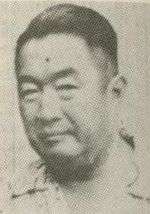Fred Young (director)
| Fred Young | |
|---|---|
|
Unknown year | |
| Born |
31 October 1900 Semarang, Dutch East Indies |
| Died |
2 June 1977 (aged 76) Malang, Indonesia |
| Ethnicity | Chinese Indonesian[1] |
| Occupation | Filmmaker |
| Years active | 1940–1974 |
Fred Young (31 October 1900 – 2 June 1977) was an ethnic Chinese film director and producer active in the Dutch East Indies and its successor state, Indonesia. He reportedly studied film in Hollywood as a youth, but only entered the nation's film industry in 1940. After he made his debut as a writer with Sorga Palsoe, he was involved in some 36 productions, 23 as director.
Biography
Young was born in Semarang, Central Java, to Chinese parents[1] on 31 October 1900. He had a junior high school education in the Dutch East Indies.[2] However, he reportedly was in Los Angeles, US, by the 1920s, learning about film with The Teng Chun and Nelson Wong.[3] Young would work with The later in his career.[4]
Young entered the film industry in 1940 when he wrote Sorga Palsoe (False Paradise).[2] Later that year he joined with SI Liem to establish Majestic Film in Batavia (now Jakarta).[5] The company's first production, Djantoeng Hati, was directed by Njoo Cheong Seng, with Liem and Young serving as producers.[6] Majestic's second production, Air Mata Iboe (Mother's Tears; 1941), a tragedy which followed a young man who takes vengeance on his siblings after they refuse to shelter their mother, was produced by Young, directed by Njoo, and starred Njoo's wife Fifi Young (no relation).[7][8]
When the Japanese occupied the Indies beginning in 1942, closing all but one film studio.[9] Young went into the theatre, establishing the Bintang Soerabaja theatre company. He did not return to film until 1949, after Indonesia proclaimed its independence, when he helped establish the Bintang Soerabaja Film Company and made his directorial debut, Sehidup Semati. That year he made one further film, Sapu Tangan.[2]
Young remained highly active throughout the 1950s,[1] directing, writing, or producing 24 films in that decade alone.[10] During the 1960s, during a time of increased discrimination against Chinese Indonesians, he began to write under the Indonesian-sounding pen name Utomo.[1] By the mid 1960s he had slowed in his filmmaking, but made a short resurgence in the 1970s. He died in Malang, East Java, on 2 June 1977.[2]
Filmography
During his career Young was involved in 36 films, directing 23 of them.[10]
|
|
References
Footnotes
- 1 2 3 4 Sun 2006, p. 122.
- 1 2 3 4 Filmindonesia.or.id, Fred Young.
- ↑ Biran 2009, p. 188.
- ↑ Filmindonesia.or.id, The Teng Chun.
- ↑ Biran 2009, p. 240.
- ↑ Filmindonesia.or.id, Djantoeng Hati.
- ↑ Biran 2009, pp. 239–241.
- ↑ Filmindonesia.or.id, Air Mata Iboe.
- ↑ Biran 2009, pp. 319, 332.
- 1 2 Filmindonesia.or.id, Filmography.
Bibliography
- "Air Mata Iboe". filmindonesia.or.id (in Indonesian). Jakarta: Konfidan Foundation. Archived from the original on 25 July 2012. Retrieved 25 July 2012.
- Biran, Misbach Yusa (2009). Sejarah Film 1900–1950: Bikin Film di Jawa [History of Film 1900–1950: Making Films in Java] (in Indonesian). Jakarta: Komunitas Bamboo working with the Jakarta Art Council. ISBN 978-979-3731-58-2.
- "Djantoeng Hati". filmindonesia.or.id (in Indonesian). Jakarta: Konfidan Foundation. Archived from the original on 25 July 2012. Retrieved 25 July 2012.
- "Fred Young". filmindonesia.or.id (in Indonesian). Konfidan Foundation. Archived from the original on 25 September 2012. Retrieved 25 September 2012.
- "Fred Young | Filmografi" [Fred Young | Filmography]. filmindonesia.or.id (in Indonesian). Jakarta: Konfidan Foundation. Archived from the original on 23 September 2012. Retrieved 23 September 2012.
- Sun, Wanning (2006). Media and the Chinese Diaspora. New York: Routledge. ISBN 978-1-134-26359-2.
- "The Teng Chun". filmindonesia.or.id (in Indonesian). Jakarta: Konfidan Foundation. Archived from the original on 26 July 2012. Retrieved 26 July 2012.
